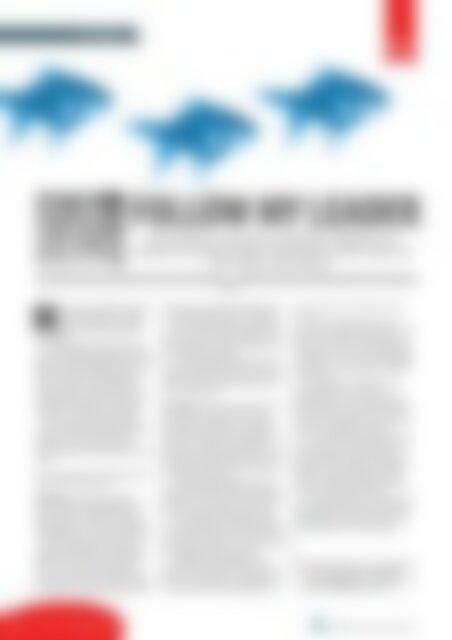201504 CM April
THE CICM JOURNAL FOR CONSUMER AND COMMERCIAL CREDIT PROFESSIONALS
THE CICM JOURNAL FOR CONSUMER AND COMMERCIAL CREDIT PROFESSIONALS
You also want an ePaper? Increase the reach of your titles
YUMPU automatically turns print PDFs into web optimized ePapers that Google loves.
HR SPECIAL<br />
FEATURE<br />
SPECIAL<br />
FOLLOW MY LEADER<br />
In the second of a new series, Vicky Bailey of Delphinus tmc<br />
considers the benefits of being a proactive and reactive leader and<br />
which style is more effective.<br />
HOW can you tell whether you have<br />
an inherently proactive or reactive<br />
style, and is either of them better<br />
suited to a successful business<br />
environment?<br />
In recent years there has been a real<br />
shift in businesses looking for their staff to<br />
have a more proactive approach to working.<br />
Bosses have been taking a longer-term<br />
view on how they run their business and<br />
they now expect the same proactivity<br />
from their staff. The employees who have<br />
a naturally reactive style could then be<br />
potentially overlooked; so is this a good<br />
thing for our current business climate?<br />
As individuals we all have the ability<br />
inside us to be both proactive and reactive,<br />
so could it just be a case of allowing<br />
ourselves to use both skill sets, and<br />
knowing when one would be better than the<br />
other?<br />
First it is important to fully understand the<br />
characteristics of both styles:<br />
Reactive: being reactive means you<br />
have the ability to handle pressure that<br />
comes your way in real time. Reactive<br />
leaders are also renowned for wanting to<br />
solve problems on their own and take the<br />
responsibility for it on their own shoulders.<br />
Other characteristics include quick<br />
thought processes which are logical and<br />
planned to turn tasks around in the here<br />
and now. Often known as ‘firefighting’,<br />
there is very little long-term planning or<br />
forward thinking involved. Reactive thinkers<br />
find it easy to make snap decisions as this<br />
style does not lend itself to analysing what<br />
might be required sometime in the future.<br />
A reactive style can be very stressful to<br />
live with, as it often means having to deal<br />
with a continuous string of problems. It can<br />
be quite difficult to motivate a team if they<br />
are all reactive employees.<br />
On the positive benefit side, a reactive<br />
leader and workforce is exactly what you<br />
need to ensure the business can survive the<br />
short-term issues and look forward to its<br />
future opportunities.<br />
Proactive: This requires a different mindset<br />
and skills, because when you don’t<br />
know what is round the corner; forward<br />
thinking and confidence is a necessity to<br />
figure out what needs to be achieved and<br />
then how to achieve it. By creating the<br />
groundwork, proactive people can run when<br />
others are just starting out because they<br />
have given themselves the time and space<br />
to analyse each decision.<br />
A forward-thinking approach can have<br />
its benefits, especially where motivating<br />
people are concerned. It has been said that<br />
this style is very infectious as once one<br />
person is proactive others want to follow.<br />
The downside of this approach is that<br />
looking into the future can sometimes take<br />
your eyes off the here and now and in times<br />
of crisis, this would not be a good thing. As<br />
George Bernard Shaw once said:<br />
“People are always blaming their<br />
circumstances for what they are. I don’t<br />
believe in circumstances. The people who<br />
get on in this world are the people who get<br />
up and look for the circumstances they<br />
want, and if they can’t find them, make<br />
them.’’<br />
So which characteristics are most<br />
beneficial to business? In essence you need<br />
both! A truly proactive person does not<br />
always have an eye on what is happening<br />
in the present. They are constantly looking<br />
to the future. This can be a very rewarding<br />
skill but the present needs to be handled<br />
correctly too.<br />
It is important to be flexible in your<br />
working approach and often it is a<br />
balancing act. If you can create a team<br />
with an equal mix of proactive and reactive<br />
members then you are sure to succeed.<br />
Your team will be able to take action in the<br />
short term, and plan for the future.<br />
So, understanding the pros and cons, it<br />
is time for you to ask yourself which style<br />
you would say you are best suited to?<br />
Can you identify a style you naturally lean<br />
towards? It is also important to consider<br />
whether you are susceptible to change.<br />
Can you honestly say you could bend to<br />
meet the needs of the business?<br />
Our word of the day is: Ownership – you<br />
are the driving force for how you behave in<br />
the workplace. Be confident in your skills<br />
set and make sure you can adapt to the<br />
changing nature of today’s business…<br />
For further information on how Delphinus<br />
tmc can help your team win please<br />
contact Vicky Bailey on 01509 215872 or<br />
email vicky@delphinustmc.co.uk<br />
30 <strong>April</strong> 2015 www.cicm.com<br />
The recognised standard in credit management


















